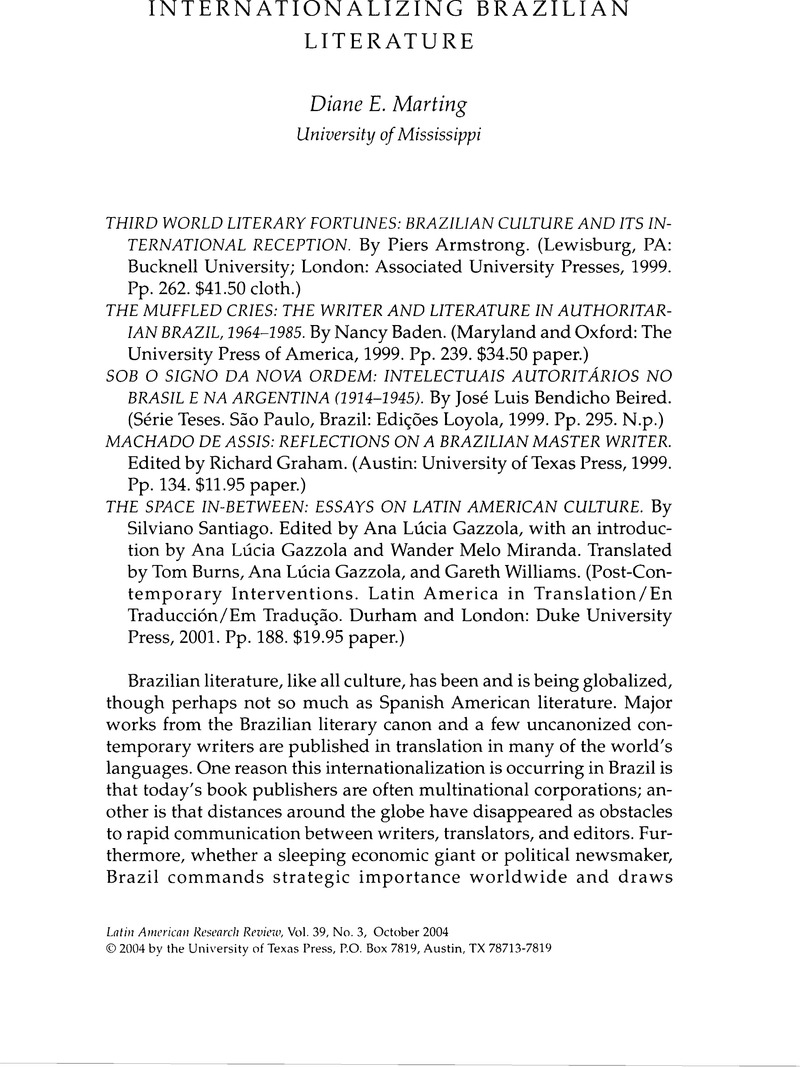No CrossRef data available.
Article contents
Internationalizing Brazilian Literature
Review products
Published online by Cambridge University Press: 05 October 2022
Abstract

- Type
- Review Essays
- Information
- Copyright
- Copyright © 2004 by the University of Texas Press
References
1. Néstor García Canclini, Hybrid Cultures: Strategies for Entering and Leaving Modernity (Minneapolis: University of Minnesota Press, 1989, 1995).
2. Luís de Camões, Os Lusíadas (New York: Oxford University Press, 1981); Os Lusíadas: Lectura, prefacio e notas de Alvarao Júlio da Costa Pimpão; apresentação Aníbal Pinto de Castro, 3rd ed. (Lisbon: Misterio da Educação, Instituto Camões, 1992).
3. The writers are: Adonias Filho, James Amado, Jorge Amado, Ivan Angelo, João Antônio, Ignácio de Loyola Brandão, Antônio Callado, Carlos Heitor Cony, Edilberto Coutinho, Roberto Drummond, Bernardo Elis, Ruy Espinheira Filho, Tânia Jamardo Faillarce, Rubem Fonseca, Oswaldo França Júnior, Heloísa Buarque de Hollanda, Lêdo Ivo, Roniwalter Jatobá, Wilson Lins, José Louzeiro, Fábio Lucas, Rubem Mauro Machado, Júlio César Monteiro Martins, Ariovaldo Matos, Roberto Reis, Affonso Romano de Sant'Anna, Silviano Santiago, Lygia Fagundes Telles, Antônio Torres, Edla Van Steen, and José J. Veiga.
4. “It was evident in 1983 when I [Baden] did a lot of the fieldwork that the role of censorship was not exactly as I had envisioned it when I began to collect data. It was also clear that some individuals were already beginning to forget some details and that several of the younger authors simply had not experienced the sixties” (x).
5. “No Brasil, os intelectuais autoritários ou participaram do aparelho de Estado ou receberam sua benevolência” (276). “A Revolução de 1930 contribui para … desenvolver a competição entre os intelectuais pela disputa do poder político e simbólico” (278). Beired is reviewed less extensively here merely because the topics are less amenable to my theme and less close to my disciplinary training, but I recommend it highly. Its tight argument and wealth of information guarantee that it will be reviewed elsewhere.
6. “The term ‘essentialism’ is here used to mean the attempt to encapsulate the identity of a vast social or cultural mass, or historical experience, in a synthesized description” (159).
7. “Written by specialists but addressed to a wide audience, books in the series consider particular literatures in an international context. The scope of the books includes the emergent literatures of the developing world; the less-taught literatures of central and eastern Europe and the Americas; and the literary traditions and languages of Asia, Africa and the Middle East” (MLA Newsletter, Fall 2003, 14).


